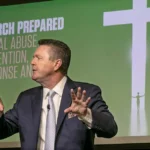Will Graham devotion: My grandfather’s defining moment
In August of 1949, my grandfather — a largely unknown young preacher, at the time — was at a Christian retreat center in the mountains east of Los Angeles, California. A spiritual battle raged inside of him. A friend who had gone to Princeton Seminary had repeatedly and passionately encouraged my grandfather to change his view on Scripture.
“People no longer accept the Bible as being inspired the way you do. Your faith is too simple,” the friend argued.
My grandfather, in his autobiography “Just As I Am,” shared, “I had no doubts concerning the deity of Jesus Christ or the validity of the gospel, but was the Bible completely true? If I was not exactly doubtful, I was certainly disturbed.”
Ultimately, after intense and prayerful study of Scripture, my grandfather fell to his knees and cried out to God. He acknowledged that he didn’t know all of the answers or how to respond to his friends’ questions but surrendered to the inerrancy of God’s word by faith.
With the spiritual battle won, the difference in his preaching was immediately noticeable. He spoke with a newfound authority. By November, the Greater Los Angeles Crusade launched this obscure North Carolina evangelist into a household name.
By my grandfather’s own admission, you likely would have never heard of Billy Graham if not for his decision to accept the full authority of Scripture. Once the matter was settled in his soul, God used him to reach millions.
The Apostle Paul, in his letter to Timothy, similarly encouraged his spiritual son to rely on Scripture and make it the center of his faith. Why?
First, it has a divine origin, with God as the author. “All Scripture is given by the inspiration of God” (2 Tim/3:16a). Not some Scripture. Not just the parts of the Bible that we like and that make us feel comfortable. No, all Scripture is given by the inspiration of God!
It is the self-revelation of God, penned by human authors under the control of the Holy Spirit. Therefore, the Bible is totally reliable for both you and I. As was the case for my grandfather, if you hope to gain anything from the Bible, this has to be a settled point. Scripture is totally from God — its origin is divine.
Second, as God’s living word, Scripture is “profitable” for us in all facets of life (2 Tim. 3:16b). The Bible is not only the road map to heaven but also the compass for the Christian life. It provides everything needed to know God, to find salvation, to be convicted of sin, to be corrected and restored and to guide followers in Christian discipline.
Finally, the Bible equips and completes us (2 Tim. 3:17). It gives us the prescription and cure for the disease of sin.
“If we confess our sins, He is faithful and just to forgive us our sins and to cleanse us from all unrighteousness” (1 John 1:9, NKJV). As we are convicted of sin, confess it, are forgiven and pursue righteousness, we mature in our faith and in our walk with God. Each new day of a Christian life should find us more and more like Jesus. From there, we are ready for “every good work” on behalf of the Kingdom.
Though circumstances, relationships, politics and culture shift and move like shaking ground, the Bible is everlasting — a firm foundation. It lights our path and meets our needs. Commit to filling your soul with the word of God, and allow Him to guide your steps.
“All Scripture is given by inspiration of God, and is profitable for doctrine, for reproof, for correction, for instruction in righteousness, that the man of God may be complete, thoroughly equipped for every good work” (2 Tim. 3:16–17, NKJV).
For more articles like this one, go to billygraham.org. This article was reprinted with permission from Billy Graham Evangelistic Association.
Looking past the clouds
In thinking about the old saying, “Behind every cloud there’s a silver lining, two Bible stories come to mind.
First, Joseph, who was sold into slavery by his brothers. He went from prison to prominence as he became the second most powerful man in Egypt at the young age of 30. He answered only to Pharaoh himself. Years later God used Joseph to rescue his father and large family, including the brothers who had betrayed him, from likely starvation.
Revenge is what Joseph’s brothers expected, but grace is what they found. Genesis 50:20–21 helps us understand how he was able to respond with merciful love.
Second, Jonah comes to mind, and you know this story too. God tells Jonah to go to Nineveh and preach, but he despised the Ninevites, so he went in a different direction to Joppa and boarded a ship bound for Tarshish.
God sent a terrible storm, where Jonah was thrown overboard and met the big fish.
Jonah asked God for forgiveness, so God told the fish to spit him out on dry land and again told Jonah to go to Nineveh. This time he obeyed and the Ninevites believed.
Instead of being thrilled with the response, Jonah was angry. He didn’t think the Ninevites deserved God’s mercy.
Joseph and Jonah each faced challenging ordeals. One man saw the silver lining and rejoiced. The other was bitter. He didn’t approve of how God had used him.
There’s no doubt God provides silver linings in abundance, but He leaves it up to us to claim them. He leaves it up to us to look past the clouds.
Neil Joiner
Vienna, Ga.
Letters to the editor
Thank you and the team for such a professional publication.
Carolyn Tomlin
Jackson, Tennessee
I wanted to commend you on the excellent job you are doing with the Stories podcast. When I listened to Season 2, episode 3, titled “Walking in Reconciliation,” I found the episode deeply moving and so encouraging to hear of what God is doing through these two congregations in Montgomery. I’ve shared the podcast with others and am so proud that you are telling these type of stories full of pain, hurt, sin, forgiveness and progress.
Know that I’m grateful for the fine work that you are doing. You are telling important stories of God at work in a most excellent way.
Pastor David Eldridge
Birmingham, Ala.
“Football is what God gave me to witness. I thank him for that. … There is only one thing … that’s everlasting … Jesus Christ.”
The Late Coach Bobby Bowden in 2018 Kentucky Today interview
For some time now, I’ve had a continual prayer that is pretty simple. I say, “Lord, change me!”
When I pray that prayer I am putting in a request to change those thoughts that stubbornly refuse to align with God’s intention for my life.
I want to change the things that keep me from fulfilling my eternal purpose. I want to change the attitudes that keep me from being a good friend or a good neighbor, or a compassionate giver. I want to change in ways that make God smile.
Oftentimes, we resist change. We imagine we’re quite fine as we are and we don’t worry about what else could be. We may even think we have reached our potential. That doesn’t appeal to me.
I believe with all my heart that my best is yet to be, and I can keep changing for the better.
The One who designed me is open to reshaping me to become more than I am right now. So I embrace change and confidently reach up and reach out to all that’s possible.
Author Karen Moore
karenmooreauthor.com
Heartache forces us to embrace God out of desperate, urgent need. God is never closer than when your heart is aching.
Author Joni Eareckson Tada
It’s been said that after real heartbreak or sorrow pastors are more gifted with words in that time, and their speech is more meaningful.
This is accounted for because of the sweet influence of grief when sanctified by the Holy Spirit.
Blessed Redeemer, we embrace your love, and having you with us is the light of our joys.
But, if your brief withdrawals help us cheer up other believers, then we thank you for leaving us.
When we seek you by night, it will in some ways cheer us that you are blessing us even when you take away your richest blessing.
Tony Martin, Mississippi
youcanhavehope.com
The International Mission Board teaches that a key element of a healthy church is the practice of healthy prayer.
Healthy prayer focuses on a relationship with the Father, recognition of who God is, resolving to commit ourselves to Him and reconciling ourselves to God and our brothers and sisters in Christ.
Healthy prayer does not have to be perfect prayer. Prayer is like anything else we do in life; it is an iterative thing. The more we pray the better we will be at it.
Persistence in prayer goes a long way toward making up for our deficiencies in prayer.
DOM Otis Corbitt
Former IMB missionary
Excerpt from his blog post at corbittscomments.blogspot.com
From the Twitterverse
@drtonyevans
I hear people say, “I don’t have to go to church to be a Christian,” and they are absolutely right. Salvation is through faith alone in Christ alone. But you don’t have to go home to be married, but stay away long enough & your relationship will be affected.
@blondeorthodoxy
One of these days, we Christians will look at all the time we’ve spent criticizing, suspecting and tweeting at each other, and we will weep.
@brocraigc
“The Holy Scriptures are our letters from home.” —Augustine
@MusingsonChrist
Many speak of our culture as becoming unhinged, fractured, hateful.
What is the key to a return to a semblance of cultural sanity?
Respect for the inviolable human conscience — Every person is accountable to God above all others.
This truth grants dignity, undermines oppression.
@AndyWWells
“The faith of a mustard seed will move mountains of adversity. And if it does not move the mountain, if sickness or poverty continue or death come, it will carry us over the mountain. The mountain will never overwhelm us.” —Vance Havner
@w_strickland
Let your speech always be with grace, as though seasoned with salt, so that you will know how you should respond to each person. —Colossians 4:6
@hershaelyork
Paul was deeply frustrated with the church when he wrote 2 Corinthians, but he began the letter with “Grace to you and peace from God our Father and the Lord Jesus Christ” (2 Cor. 1:2). May our desire for others to know grace and peace overwhelm our frustrations with them!
@desiringGod
Some of us neglect the glorious bodies we’ve been given. Others become obsessed with cultivating strength and fitness. But God calls us to modestly maintain our bodies — so that we are fit to do good.










